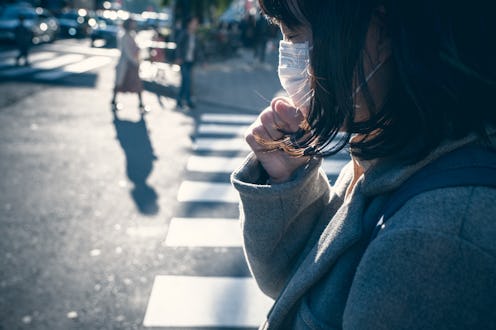Life
People Are Becoming Doctors To Help Address Climate Change’s Health Risks

Climate change health risks are increasingly having a negative impact on people around the world. Increased rates of global warming are triggering extreme weather events, endangering our food supply, and causing mass extinctions of the world’s species, but they're also making humans sick. According to 29 scientists in the European Academies' Science Advisory Council (EASAC), climate change health risks will only increase as time goes on, unless people do something to combat this crisis. One of the most impactful ways to do this is to address the shortage of U.S. health-care professionals as well as the lack of diversity among them.
The EASAC report says that when people experience displacement or injury due to extreme weather, it can trigger post-traumatic stress disorder, anxiety, substance abuse, and depression. Additionally, with increasing temperatures comes increasing rates of cardiovascular and respiratory diseases. Rare mosquito-borne illnesses, like dengue fever, also run the risk of spreading to more people as temperatures climb.
The EASAC report focuses on the impact of climate disaster in Europe, but due to economic inequality, other regions around the globe can face even higher risks. Just this year, heatwaves in India caused dozens of deaths. Climate disaster is also linked to increased rates of sexual violence against women and homelessness, both of which are public health issues.
And with their still-developing bodies, children and infants experience disproportionate rates of climate-related health conditions from the burning of fossil fuels, according to a letter by public health experts in the New England Journal of Medicine. Higher temperatures also increase the risk of heat stroke for both children and elderly folks.
And it might be very difficult for people with these illnesses to seek help. There's already a shortage of health professionals in the U.S., according to CNN, but this shortage only becomes worse in rural areas, which are often the regions most negatively impacted by climate change. According to the National Organization of State Offices of Rural Health, about 22% percent of people living in rural areas don't have health insurance, compared to 14.3% of people living in urban areas.
Affordable and timely healthcare is also increasingly difficult for Americans to access. But even when healthcare is accessible, racial and gender bias among healthcare professionals can endanger lives. Combined, Black people, American Indians, and Latinx people make up a little over 13% of all U.S. doctors. And according to NPR, 31% of transgender people don’t have regular access to health care.
The most vulnerable populations will be most impacted by climate disaster. Just consider that studies show that Black and Latinx populations breathe more pollution than white people, but create less pollution. Disparities in health care access are just another way that marginalized groups experience more harm as a result of climate change.
This information can be depressing, and it’s easy to feel hopeless about our ability to provide adequate care for the health issues brought by climate change. Our healthcare system is already stacked against people of color, trans people, women, and people experiencing homelessness, and climate disaster will only exacerbate that.
Many people recognize this threat, and they're seeking the education required to make a difference. Cameron Clarke, a Rhodes Scholar studying public health and policy at Oxford University, tells Bustle that he's studying medicine because he wants to "translate and communicate global phenomena like climate change down into a relevant clinical setting, and then uplift a patient’s experience to make it salient in policymaking."
Clarke isn't alone. Students at Harvard Medical School are delving into environmental medicine, so that they can study the ways that climate disaster impacts human health. Clarke identifies as Black, and he stresses that while increasing the number of doctors of color is necessary, it won't automatically fix racial bias in healthcare. "As with everything, the question of who will be most harmed by climate change has always been a question of power and agency...None of us are immune from internalizing or perpetuating racism," Clarke says.
Clarke's focus on policy also shows us the power we have as citizens. On their website, The Green Party says that the Green New Deal, an expansive legislative proposal to prevent climate destuction, "pays for itself in healthcare savings from the prevention of fossil fuel-related diseases, including asthma, heart attacks, strokes and cancer.” Legislation like the Green New Deal was introduced because Americans told their lawmakers that climate disaster was an issue that deeply concerned them. Concerned citizens can also tell their representatives that ensuring healthcare access to all is a necessity.
Climate disaster won't be averted without eliminating the dependence of fossil fuels and greatly reducing carbon emissions. But the EASAC report also shows us that health care systems can't afford to fail to those who will be affected by climate disaster the most.